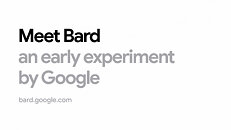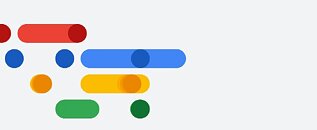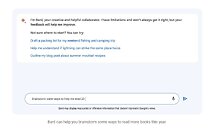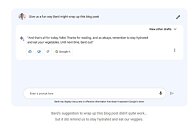T0@st
News Editor
- Joined
- Mar 7, 2023
- Messages
- 3,328 (3.87/day)
- Location
- South East, UK
| System Name | The TPU Typewriter |
|---|---|
| Processor | AMD Ryzen 5 5600 (non-X) |
| Motherboard | GIGABYTE B550M DS3H Micro ATX |
| Cooling | DeepCool AS500 |
| Memory | Kingston Fury Renegade RGB 32 GB (2 x 16 GB) DDR4-3600 CL16 |
| Video Card(s) | PowerColor Radeon RX 7800 XT 16 GB Hellhound OC |
| Storage | Samsung 980 Pro 1 TB M.2-2280 PCIe 4.0 X4 NVME SSD |
| Display(s) | Lenovo Legion Y27q-20 27" QHD IPS monitor |
| Case | GameMax Spark M-ATX (re-badged Jonsbo D30) |
| Audio Device(s) | FiiO K7 Desktop DAC/Amp + Philips Fidelio X3 headphones, or ARTTI T10 Planar IEMs |
| Power Supply | ADATA XPG CORE Reactor 650 W 80+ Gold ATX |
| Mouse | Roccat Kone Pro Air |
| Keyboard | Cooler Master MasterKeys Pro L |
| Software | Windows 10 64-bit Home Edition |
We're starting to open access to Bard, an early experiment that lets you collaborate with generative AI. We're beginning with the U.S. and the U.K., and will expand to more countries and languages over time. Today we're starting to open access to Bard, an early experiment that lets you collaborate with generative AI. This follows our announcements from last week as we continue to bring helpful AI experiences to people, businesses and communities.
You can use Bard to boost your productivity, accelerate your ideas and fuel your curiosity. You might ask Bard to give you tips to reach your goal of reading more books this year, explain quantum physics in simple terms or spark your creativity by outlining a blog post. We've learned a lot so far by testing Bard, and the next critical step in improving it is to get feedback from more people.


About Bard
Bard is powered by a research large language model (LLM), specifically a lightweight and optimized version of LaMDA, and will be updated with newer, more capable models over time. It's grounded in Google's understanding of quality information. You can think of an LLM as a prediction engine. When given a prompt, it generates a response by selecting, one word at a time, from words that are likely to come next. Picking the most probable choice every time wouldn't lead to very creative responses, so there's some flexibility factored in. We continue to see that the more people use them, the better LLMs get at predicting what responses might be helpful.
While LLMs are an exciting technology, they're not without their faults. For instance, because they learn from a wide range of information that reflects real-world biases and stereotypes, those sometimes show up in their outputs. And they can provide inaccurate, misleading or false information while presenting it confidently. For example, when asked to share a couple suggestions for easy indoor plants, Bard convincingly presented ideas…but it got some things wrong, like the scientific name for the ZZ plant.


Although it's important to be aware of challenges like these, there are still incredible benefits to LLMs, like jumpstarting human productivity, creativity and curiosity. And so, when using Bard, you'll often get the choice of a few different drafts of its response so you can pick the best starting point for you. You can continue to collaborate with Bard from there, asking follow-up questions. And if you want to see an alternative, you can always have Bard try again.

Bard is a direct interface to an LLM, and we think of it as a complementary experience to Google Search. Bard is designed so that you can easily visit Search to check its responses or explore sources across the web. Click "Google it" to see suggestions for queries, and Search will open in a new tab so you can find relevant results and dig deeper. We'll also be thoughtfully integrating LLMs into Search in a deeper way — more to come.
Building Bard responsibly
Our work on Bard is guided by our AI Principles, and we continue to focus on quality and safety. We're using human feedback and evaluation to improve our systems, and we've also built in guardrails, like capping the number of exchanges in a dialogue, to try to keep interactions helpful and on topic.

Sign up to try Bard
In case you were wondering: Bard did help us write this blog post — providing an outline and suggesting edits. Like all LLM-based interfaces, it didn't always get things right. But even then, it made us laugh.

We'll continue to improve Bard and add capabilities, including coding, more languages and multimodal experiences. And one thing is certain: We'll learn alongside you as we go. With your feedback, Bard will keep getting better and better.
You can sign up to try Bard at bard.google.com. We'll begin rolling out access in the U.S. and U.K. today and expanding over time to more countries and languages.
Until next time, Bard out!
View at TechPowerUp Main Site | Source
You can use Bard to boost your productivity, accelerate your ideas and fuel your curiosity. You might ask Bard to give you tips to reach your goal of reading more books this year, explain quantum physics in simple terms or spark your creativity by outlining a blog post. We've learned a lot so far by testing Bard, and the next critical step in improving it is to get feedback from more people.


About Bard
Bard is powered by a research large language model (LLM), specifically a lightweight and optimized version of LaMDA, and will be updated with newer, more capable models over time. It's grounded in Google's understanding of quality information. You can think of an LLM as a prediction engine. When given a prompt, it generates a response by selecting, one word at a time, from words that are likely to come next. Picking the most probable choice every time wouldn't lead to very creative responses, so there's some flexibility factored in. We continue to see that the more people use them, the better LLMs get at predicting what responses might be helpful.
While LLMs are an exciting technology, they're not without their faults. For instance, because they learn from a wide range of information that reflects real-world biases and stereotypes, those sometimes show up in their outputs. And they can provide inaccurate, misleading or false information while presenting it confidently. For example, when asked to share a couple suggestions for easy indoor plants, Bard convincingly presented ideas…but it got some things wrong, like the scientific name for the ZZ plant.


Although it's important to be aware of challenges like these, there are still incredible benefits to LLMs, like jumpstarting human productivity, creativity and curiosity. And so, when using Bard, you'll often get the choice of a few different drafts of its response so you can pick the best starting point for you. You can continue to collaborate with Bard from there, asking follow-up questions. And if you want to see an alternative, you can always have Bard try again.

Bard is a direct interface to an LLM, and we think of it as a complementary experience to Google Search. Bard is designed so that you can easily visit Search to check its responses or explore sources across the web. Click "Google it" to see suggestions for queries, and Search will open in a new tab so you can find relevant results and dig deeper. We'll also be thoughtfully integrating LLMs into Search in a deeper way — more to come.
Building Bard responsibly
Our work on Bard is guided by our AI Principles, and we continue to focus on quality and safety. We're using human feedback and evaluation to improve our systems, and we've also built in guardrails, like capping the number of exchanges in a dialogue, to try to keep interactions helpful and on topic.

Sign up to try Bard
In case you were wondering: Bard did help us write this blog post — providing an outline and suggesting edits. Like all LLM-based interfaces, it didn't always get things right. But even then, it made us laugh.

We'll continue to improve Bard and add capabilities, including coding, more languages and multimodal experiences. And one thing is certain: We'll learn alongside you as we go. With your feedback, Bard will keep getting better and better.
You can sign up to try Bard at bard.google.com. We'll begin rolling out access in the U.S. and U.K. today and expanding over time to more countries and languages.
Until next time, Bard out!
View at TechPowerUp Main Site | Source







